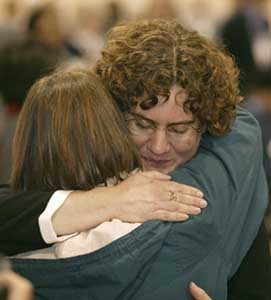-
- Methodist appeals panel reinstates defrocked lesbian minister
- 500 gay-rights supporters protest Focus on Family
- Navajo president vetoes same-sex marriage ban
- Ex-gay counselor invited back onto national advisory panel
- Southwestern Missouri school district plans to lift ban on gay-pride T-shirts
- Microsoft may reconsider its stance on gay rights bill, which failed by one vote
- High court to review law penalizing schools that bar military recruiters
- National News Briefs
- World News Briefs
national
Methodist appeals panel reinstates defrocked lesbian minister
Opinion must be endorsed by Methodist Judicial Council before it becomes church law
Published Thursday, 05-May-2005 in issue 906
LINTHICUM, Md. (AP) – A Methodist court April 29 reinstated a gay minister who had been defrocked for telling her congregation of her relationship with another woman.
The United Methodist Church appeals panel, which heard three hours of arguments before beginning deliberations, voted 8 to 1 to set aside the December decision by another church court to oust Irene “Beth” Stroud for violating the denomination’s ban on “self-avowed, practicing homosexual” clergy.
The panel declared the ban “null and void” because church procedures weren’t followed when it was adopted. However, Jim Allen, general counsel for the church’s finance and administration agency, said the opinion would have to be endorsed by the highest Methodist court, the Judicial Council, before it became church law.
The ruling was sure to inflame traditional Methodists who have been outraged that church leaders haven’t done more to enforce the ban on actively gay clergy. The church is expected to appeal the decision.
“It sends a message that our church, as divided as it is, does have the resources to be inclusive to all people, regardless of sexual orientation,” Stroud said after the decision was announced. “But the division and the hurt in the church won’t be solved by anything in my case. It’s going to take years.”
Stroud said that even though she has been reinstated, she won’t resume ministerial duties until the appeals process is completed. “It’s not something that I can take off and put on again like a suit of clothes, so I will wait until it’s completely over,” Stroud said.
The Rev. Thomas Hall, a counsel for the church, said of the ruling: “This is way overstepping the boundaries of church law. We are doing harm to 40,000 other Methodist ministers out there who think we should have some boundaries.”
The case stems from Stroud’s announcement two years ago to her Philadelphia congregation that she was living with a woman, a step documented in a two-hour film about First United Methodist Church of Germantown that aired last year on PBS. The documentary, “The Congregation,” recorded two years in the life of the church and did not focus solely on the issue of Stroud’s homosexuality.
The United Methodist Church accepts gay and lesbian ministers as long as they are celibate. When Stroud publicly announced her relationship, her bishop was required to start the defrocking process, church officials said. She kept the title of associate minister at her church and worked there in a lay capacity.
The church’s Northeastern Jurisdictional Committee on Appeals, which hears cases from 12 states and the District of Columbia, said the evidence against Stroud was “overwhelming,” but that she was denied due process in her trial because Methodist bodies had not properly defined terms related to the ban on gay clergy.
Methodist law says a person can’t be denied membership in the church because of their “status.” The panel said that because it wasn’t clear whether the term “status” included sexual orientation, Stroud’s trial was unfair. The panel also said the term “practicing homosexual” had never been adequately defined.
The panel, which declined to comment on the ruling, also said the ban on gay clergy had been inappropriately raised to the level of church doctrine without being subjected to all of the official steps required.
Stroud is one of three gay clergy members tried since the Methodist General Conference passed a ban against them in 1984. The Rev. Rose Mary Denman of New Hampshire was defrocked in 1987. The Rev. Karen Dammann of Washington state was acquitted last March because of an ambiguity in church law that the Methodist supreme court has since eliminated.
Mark Tooley, of the Institute on Religion and Democracy, an advocacy group for conservative mainline Protestants, called the opinion a “short-term issue,” predicting the Methodist high court will overturn the decision.
“Politically and demographically, the church has shown itself to be moving in a more conservative direction and not in the direction of Beth Strouds,” Tooley said.
There are 8.3 million United Methodists nationwide, making it the second-largest Protestant denomination in the United States, and a total of 11 million worldwide.
“This will be something that will be talked about by bishops and ministers and laity in churches around the world,” said John Schol, the Methodist bishop for Maryland, the District of Columbia and parts of West Virginia. “The United Methodist Church is not of one mind on this issue. We continue to prayerfully struggle and be on a journey together.”
|
|
Copyright © 2003-2025 Uptown Publications


